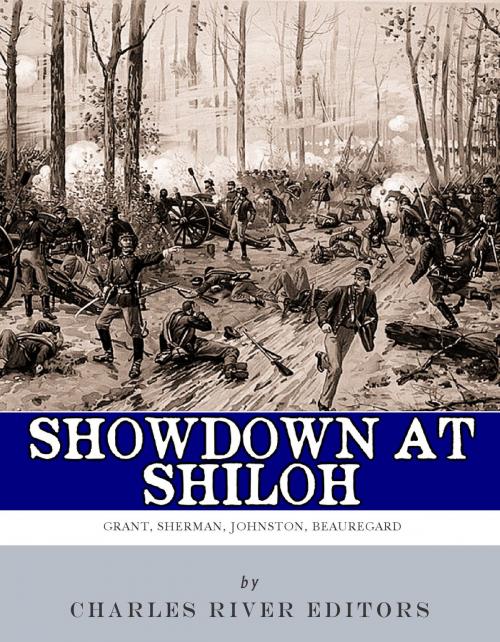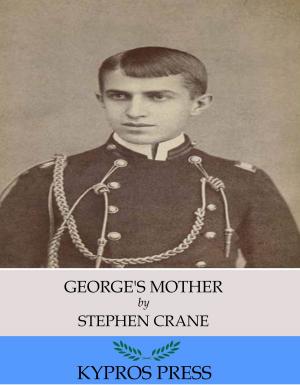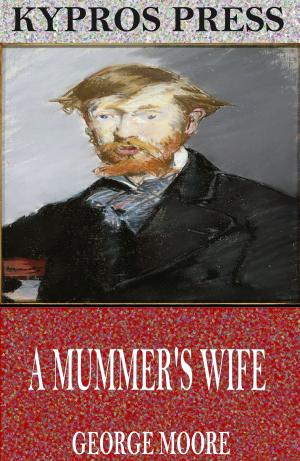Showdown at Shiloh: The Lives and Careers of Ulysses S. Grant, William Tecumseh Sherman, Albert Sidney Johnston and P.G.T. Beauregard
Nonfiction, History, Americas, United States, Civil War Period (1850-1877), 19th Century| Author: | Charles River Editors | ISBN: | 9781475322484 |
| Publisher: | Charles River Editors | Publication: | March 2, 2013 |
| Imprint: | Language: | English |
| Author: | Charles River Editors |
| ISBN: | 9781475322484 |
| Publisher: | Charles River Editors |
| Publication: | March 2, 2013 |
| Imprint: | |
| Language: | English |
*Weaves the lives of the 4 generals into one entertaining and educational narrative.*Includes maps and accounts of the fighting at Shiloh by several important generals.*Includes an original introduction for each general.*Includes Bibliographies of each general.*Includes a Table of Contents. After Union General Ulysses S. Grant captured Fort Henry and Fort Donelson in early 1862, Confederate General Albert Sidney Johnston, widely considered the Confederacys best general, concentrated his forces in northern Georgia and prepared for a major offensive that culminated with the biggest battle of the war to that point, the Battle of Shiloh. On the morning of April 6, Johnston directed an all out attack on Grants army around Shiloh Church, and though Grants men had been encamped there, they had failed to create defensive fortifications or earthworks. They were also badly caught by surprise. With nearly 45,000 Confederates attacking, Johnstons army began to steadily push Grants men back toward the river. As fate would have it, the Confederates may have been undone by friendly fire at Shiloh. Johnston advanced out ahead of his men on horseback while directing a charge near a peach orchard when he was hit in the lower leg by a bullet that historians now widely believe was fired by his own men. Nobody thought the wound was serious, including Johnston, who continued to aggressively lead his men and even sent his personal physician to treat wounded Union soldiers taken captive. But the bullet had clipped an artery, and shortly after being wounded Johnston began to feel faint in the saddle. With blood filling up his boot, Johnston unwittingly bled to death. The delay caused by his death, and the transfer of command to subordinate P.G.T. Beauregard, bought the Union defenders critical time on April 6, and the following day Grants reinforced army struck back and pushed the Confederate army off the field.The Battle of Shiloh lasted two days, but the battle over the battle had just begun. Grants army had just won the biggest battle in the history of North America, with nearly 24,000 combined casualties among the Union and Confederate forces. Usually the winner of a major battle is hailed as a hero, but Grant was hardly a winner at Shiloh. The Battle of Shiloh took place before costlier battles at places like Antietam and Gettysburg, so the extent of the casualties at Shiloh shocked the nation. Moreover, at Shiloh the casualties were viewed as needless; Grant was pilloried for allowing the Confederates to take his forces by surprise, as well as the failure to build defensive earthworks and fortifications, which nearly resulted in a rout of his army. Speculation again arose that Grant had a drinking problem, and some even assumed he was drunk during the battle. Though the Union won, it was largely viewed that their success owed to the heroics of General Sherman in rallying the men and Don Carlos Buell arriving with his army, and General Buell was happy to receive the credit at Grants expense. As a result of the Battle of Shiloh, Grant was demoted to second-in-command of all armies in his department, an utterly powerless position. And when word of what many considered a “colossal blunder” reached Washington, several congressmen insisted that Lincoln replace Grant in the field. Lincoln famously defended Grant, telling critics, “I cant spare this man. He fights.” Showdown at Shiloh comprehensively covers the decisive battle, as well as the lives, careers and legacies of the 4 most important generals of the battle. Along with maps, pictures, and more, you will learn about Sherman, Grant, Johnston and Beauregard like you never have before.
*Weaves the lives of the 4 generals into one entertaining and educational narrative.*Includes maps and accounts of the fighting at Shiloh by several important generals.*Includes an original introduction for each general.*Includes Bibliographies of each general.*Includes a Table of Contents. After Union General Ulysses S. Grant captured Fort Henry and Fort Donelson in early 1862, Confederate General Albert Sidney Johnston, widely considered the Confederacys best general, concentrated his forces in northern Georgia and prepared for a major offensive that culminated with the biggest battle of the war to that point, the Battle of Shiloh. On the morning of April 6, Johnston directed an all out attack on Grants army around Shiloh Church, and though Grants men had been encamped there, they had failed to create defensive fortifications or earthworks. They were also badly caught by surprise. With nearly 45,000 Confederates attacking, Johnstons army began to steadily push Grants men back toward the river. As fate would have it, the Confederates may have been undone by friendly fire at Shiloh. Johnston advanced out ahead of his men on horseback while directing a charge near a peach orchard when he was hit in the lower leg by a bullet that historians now widely believe was fired by his own men. Nobody thought the wound was serious, including Johnston, who continued to aggressively lead his men and even sent his personal physician to treat wounded Union soldiers taken captive. But the bullet had clipped an artery, and shortly after being wounded Johnston began to feel faint in the saddle. With blood filling up his boot, Johnston unwittingly bled to death. The delay caused by his death, and the transfer of command to subordinate P.G.T. Beauregard, bought the Union defenders critical time on April 6, and the following day Grants reinforced army struck back and pushed the Confederate army off the field.The Battle of Shiloh lasted two days, but the battle over the battle had just begun. Grants army had just won the biggest battle in the history of North America, with nearly 24,000 combined casualties among the Union and Confederate forces. Usually the winner of a major battle is hailed as a hero, but Grant was hardly a winner at Shiloh. The Battle of Shiloh took place before costlier battles at places like Antietam and Gettysburg, so the extent of the casualties at Shiloh shocked the nation. Moreover, at Shiloh the casualties were viewed as needless; Grant was pilloried for allowing the Confederates to take his forces by surprise, as well as the failure to build defensive earthworks and fortifications, which nearly resulted in a rout of his army. Speculation again arose that Grant had a drinking problem, and some even assumed he was drunk during the battle. Though the Union won, it was largely viewed that their success owed to the heroics of General Sherman in rallying the men and Don Carlos Buell arriving with his army, and General Buell was happy to receive the credit at Grants expense. As a result of the Battle of Shiloh, Grant was demoted to second-in-command of all armies in his department, an utterly powerless position. And when word of what many considered a “colossal blunder” reached Washington, several congressmen insisted that Lincoln replace Grant in the field. Lincoln famously defended Grant, telling critics, “I cant spare this man. He fights.” Showdown at Shiloh comprehensively covers the decisive battle, as well as the lives, careers and legacies of the 4 most important generals of the battle. Along with maps, pictures, and more, you will learn about Sherman, Grant, Johnston and Beauregard like you never have before.















